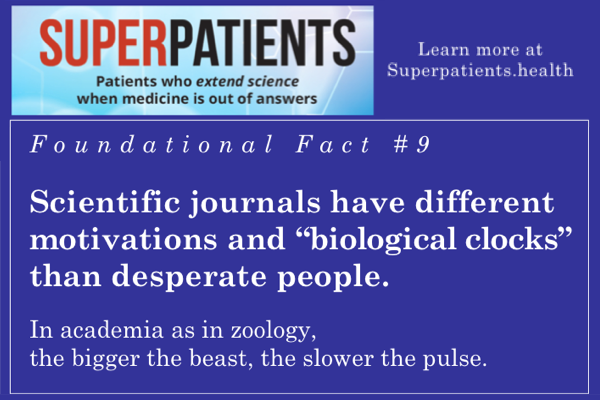Next in the series of fourteen foundation truths about Superpatients.

When your life’s on the line, you may think that all new knowledge will be rushed to the front lines as fast as possible. Not so much.
At one conference where I spoke, someone summed it up thus: “The bigger the beast, the slower the pulse.” He was drawing an analogy to mammal biology: an enormous whale’s heart beats six times a minute, while the Etruscan shrew’s is 140 times faster:

The superpatient’s problem is that medical publishing can be a slow process: it can take years for new knowledge to reach the point of need. Fifteen years ago Ferguson said it took 2-5 years, and called it “the lethal lag time.”
What you see in the best patient communities is people who are actively in touch with leading-edge researchers, so they know what research is in process long before it’s published. And sometimes these researchers are more than happy to share their knowledge.
I knew a breast cancer patient, Judy Feder, who prolonged her life eighteen months by connecting with a researcher recommended by one of the four e-patient communities she belonged to.
If this subject – the whale-like pace of science – interests you, here are related posts on how long it’s actually taken throughout history:
- A comment on that post:
17 years is not too bad, considering how long it took the British Empire to implement practices to conquer scurvy. The entire article is a good read:
The Healthcare Singularity and the Age of Semantic Medicine…The total time from Lancaster’s definitive demonstration of how to prevent scurvy to adoption across the British Empire was 264 years.
Next: #10 – “The lethal lag time” – new knowledge doesn’t flow instantly to everywhere


Leave a Reply